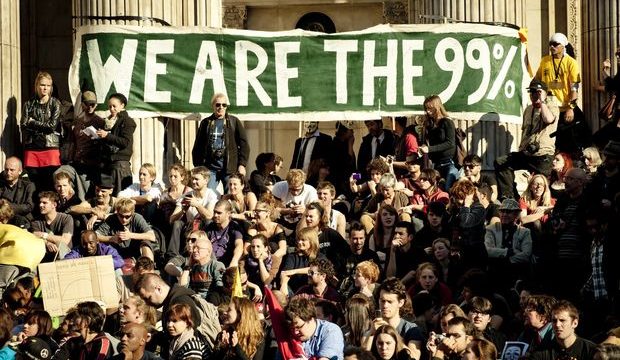Income Inequality Is Irrelevant: North Dakota Has 6th Highest Threshold For "1%"

Fargo Forum reporter, and Occupy Wall Street enthusiast, Patrick Springer has an article today about income inequality in North Dakota, noting that the state has the 6th highest income threshold for inclusion in 1 percent.
The maligned 1 percent, according to Springer:
Membership in the much-maligned top 1 percent of income earners in North Dakota would require annual income of at least $502,393.
That figure ranks sixth in the nation for 2012, right behind the state of New York, in a new study called “The Increasingly Unequal States of America.”
The report, released this week by the Economic Analysis and Research Network, examined income inequality by state from 1917 to 2012, and the declining middle class.
Minnesota ranked 11th, with the top 1 percent income threshold of $413,748, and South Dakota ranked 13th at $404,010. The national average was $385,195, according to the report.
The widening gap between the nation’s richest and the masses, and the shrinking middle class, has been the subject of increased attention in recent years.
I’m always chagrined when we talk about the most financially successful people in our midst as though there were something inherently wrong with being so successful. Sure, someone who got rich through something like fraud or theft should be maligned, but that’s not how most people get rich.
Most of America’s “1 percent” made it there by providing value to other people. Maybe it’s an innovator who dreamed up some new product or service that people loved. Maybe it’s an entertainer or an athlete who can entrance us with their talent. Maybe it’s an investor who provided capital so that other talented people could succeed.
Why should we malign these people simply because they’ve achieved so much more than the rest of us? The only justification I can think of is one rooted in economic illiteracy.
Namely, the idea that wealth is a zero sum game, and that one person’s success comes at the expense of another’s. Which is not true. Wealth is created, and by right must belong to its creator.
But that aside, we cannot look at so-called “income inequality” without also recognizing the value those successful folks in the 1 percent bring to the rest of us. I mean sure, Bill Gates is fantastically wealthy, but his products are being used on computers in just about every home and business in America. Why shouldn’t he be in the 1 percent? He did somthing that most of us couldn’t.
We shouldn’t malign the 1 percent. We should celebrate them, and ask ourselves how we might ensure that all of those with talent and ingenuity and a solid work ethic have opportunities to succeed.
Because there’s always going to be a 1 percent. There’s always going to be certain people who are exceptional, and who rise above the rest in terms of success. We should be thankful they’re among us, not resentful of their achievements.




